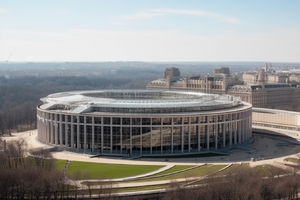Parliament of Brumen
This article is incomplete because it is pending further input from participants, or it is a work-in-progress by one author. Please comment on this article's talk page to share your input, comments and questions. Note: To contribute to this article, you may need to seek help from the author(s) of this page. |
Reichskammern | |
|---|---|
 Logo of the Reichskammern | |
| Type | |
| Type | |
| Houses | Conclave Congress |
| History | |
| Founded | August 1589, 433 years ago |
| Preceded by | Royal Chambers Oberhaus |
New session started | December 2017 |
| Leadership | |
Speaker of the Conclave | Josephine Reitz, People's since 2017 General Election |
Speaker of the Congress | Hannes Sondheim, People's since 2017 General Election |
| Structure | |
 | |
Conclave political groups | 110 Seats Government (47)
Confidence & Supply (8)
Opposition (55)
|
 | |
Congress political groups | 450 Seats Government (251)
Opposition (199)
|
Length of term | 5 Years |
| Authority | |
| Salary | $151,000 Per Annum |
| Elections | |
Conclave voting system | Single Transferable Vote |
Congress voting system | Instant-Runoff Vote |
Last election | December 2017 |
Next election | December 2022 |
| Meeting place | |
 | |
| The Reichskammern Building | |
| Constitution | |
| Articles of Union | |
The Parliament of Brumen, officially referred to the Reichskammern (Brumenese: Chambers of the Realm), is the supreme legislative body of the Kingdom of Brumen. All other political bodies within the Kingdom, with the exception of the executive and judicial bodies, ultimately answer to the Bundeskammern. The seat of parliament is at Domain Interchange at Parliament Square within Dinsmark, the capital city of Brumen. The Bundeskammern is bicameral in nature and is comprised of two houses: Council of the Realm and Congress of the Realm. Congress is the lower house and proposes legislation to the upper house to be approved and ratified and monitors the government. The Council is the upper house, is proportionally elected and is vested with significant powers as it has the capacity to either pass or block legislation put forward by the Chancellor and the Congress.
Brumen has had a rocky history with legislative bodies, with the Oberhaus generally considered a proto-legislative body, its membership comprised of selected members of nobility from the various realms within the Kingdom. Its function was largely relegated as an advisory body for the monarch, able to provide advise and guidance but with no real decision making power for long term or day-to-day direction of the kingdom. The First Insurrection in 1589 resulted in sweeping legislative reform for the nation: the Oberhaus was formalized as the kingdom's unicameral legislative body and vested with more decision making powers, though its membership composition remained largely unchanged. The Third Insurrection of 1919-1922 resulted in more profound changes. The Oberhaus was reorganized as the Reichskammern in 1922 with the implementation as part of the Second Reformations which introduced a democratically elected bicameral parliament.
Membership within the Council & Congress represents all nine constituent realms of the Brumen. The Council consists of 110 elected Councilors, whereas Congress consists of 450 representatives. Politics within the Reichskammern has historically been dominated by major two parties: the center-right Conservative Constitutional Party and the left-wing Trade Union Congress. While both parties dominate day-to-day decisions within Congress a multitude of parties dominate the scene of the Council. As noted the Council is vested with significantly higher powers as it possess the ability to block passage of a bill proposed by either the lower house or Chancellor. In the event that a bill that has been passed by Congress has been blocked twice, then the Speaker of the Chancellor may advise the reigning Monarch for a double dissolution. This act will dissolve one or both houses of parliament, bringing forward a snap election. If after a double dissolution the same bill still cannot be approved by both houses then the Chancellor will convene for a joint sitting of both houses where the bill, or bills, and any of its amendments will be considered by both houses.
History
TBD
TBD
TBD
TBD
Organization
Council of the Realm
The Council is the upper house of parliament and is vested with significant powers, its duty is to approve or reject legislation that has been approved by Congress. The Council is not permitted to amend nor create new legislation. One hundred and ten Senators serve in the Council and every realm is given representation. This representation was established to ensure that the concerns and voices of all realms are heard on equal and fair grounds in a centralized legislature. Each realm is assigned a total of four senators whereas Waldreich has been designated with twenty senators. All senators are also directly elected by voters and its members are elected once every five years unless a double dissolution of the Council has been triggered by the reigning monarch of Brumen. All sessions of the Council are led by the Speaker of the Council who is a member of the ruling government party.
Originally, senators were elected with a winner-takes all voting system. Under this system no parties other than the People's Alliance and Conservatives has been able to shape national policy within the Council. Since 1959 the single-transferable vote and proportional representation on a realm-by-realm basis became the standard method of voting to elect senators. This change led to the rise of a number of smaller minor parties who were unable to obtain any seats in Congress, but had just enough votes to send one to five senators in the Council. Many parties vie for a seat in the Council as it was seen as a key place where national policies are either approved or rejected. Governments who have obtained a majority in Congress but fail to do so in the Council can be frustrated when their legislation is blocked by a hostile Council. This unique aspect of the Reichskammern has encouraged politicians to refrain from pursuing agendas that were deemed as extreme. This also allows the opposition, who may not have the numbers to challenge the government in Congress, to closely scrutinize the government as the opposition would most likely be able to face the government on equal footing in terms of numbers.
Congress of the Realm
Congress is the lower house of the Reichskammern and consists of 450 members and is comprised of single member electorates with roughly the same population. The role of Congress is to propose, draft, approve, reject and amend legislation put forward by itself or the Chancellor. Unlike the parliaments of a pure Westminster model, the government may not always be the largest party in Congress. There are no mandates for governments to obtain a majority of the seats within Congress in order for a new government to be formed. However in the event that no single party could achieve a majority threshold in the Assembly, the largest party at the time is required by law to form alliances with one and another to form government. Currently the People's Alliance party has enjoyed a majority government since it was elected into power in 2002.
Any piece of legislation introduced by either the Chancellor or Congress itself must be debated and approved Congress. Upon approval the legislation will be forwarded to the Council where it will be scrutinized before it is approved and signed into law by the Monarch. Should the legislation fail to be passed by the Council it will be returned to Congress to be reviewed. If the Council fails to pass a legislation twice the Chancellor may recommend the reigning Monarch to invoke Article 4 of the nation's constitution. Invoking Article 4 will allow the Monarch to simultaneously dissolve both houses of the Reichskammern and call for fresh elections.
Major Parties
Constitution Party
The Constitution Party is a constitutional, liberal conservative political party and is a major party of the center-right in Brumenese politics. The party is led by Immanual von Dinsmark who is the current Chancellor of Brumen and generally represent the interests of the middle class and members of the nation's nobility. The party was officially founded on 13 June 1922 but many consider 5 May 1919 as its true founding date as it was the day when Ulrich Hoffman issued a royal decree that condemned Brumen's corrupt monarchy and precipiated the start of the Third Insurrection.